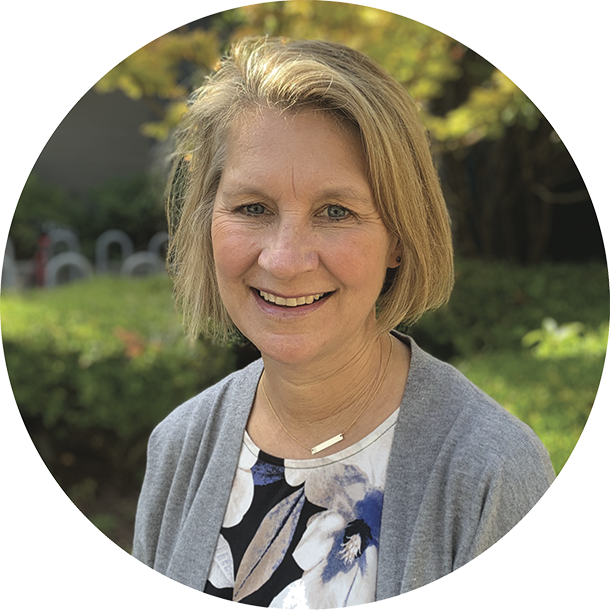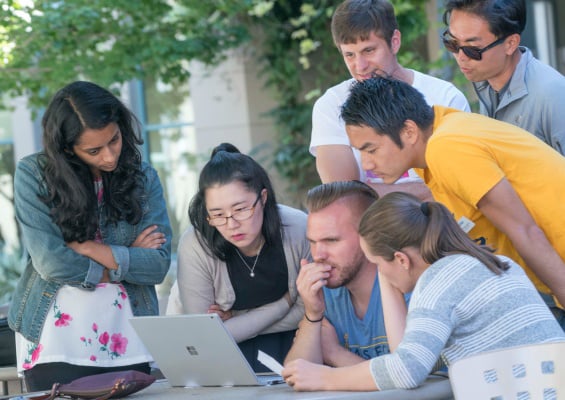Having business skills is beneficial in a lot of jobs, but some undergraduate students don’t consider taking many, if any, classes in marketing, finance, or data analysis while they are pursuing their degree. Once they enter the workforce, they sometimes realize the value that a business degree can bring to their company. It helps the average worker see the bigger picture and understand why certain decisions are made.
A lot of people in industries such as tech, logistics, manufacturing, and even medicine make the decision to pursue an MBA instead of grad school in their original field to beef up their knowledge. It can potentially lead to more career opportunities, and in some cases, a path to the C-suite. But taking a break from a career to pursue an MBA isn’t always feasible for someone who already has a fulfilling job. Stepping away from the workforce for a few years can have a financial impact on most people and their families.
The solution is usually a part time MBA program. These have been around for a few decades but the idea behind them is that someone can get the same degree as a traditional MBA student while still remaining in the workforce. Haas School of Business, University of California, Berkeley’s Evening & Weekend MBA program has consistently been named one of the top part time MBA programs year after year. Within the EWMBA, prospective students have a choice and can opt for either the Evening program, the Weekend program, or the newer Flex option. Haas was the first top 10 business school to offer a remote MBA.
The Flex program is not the typical online MBA. Students have scheduled, synchronous, online meeting times for classes along with self paced work and study groups. Throughout the course of the three year program, students are required to do three scheduled in-person immersions. The inaugural class has proven that this style of learning can be successful. A second cohort launched in 2023.In July of 2024, two more cohorts began their MBA journey.
Diversifying the traditional business school by giving people better access means that the student body is also becoming more diverse. Because of its unique format, the Flex program attracts students from all over the world and from a variety of careers.
A career enhancing degree
Many people who decide to get their MBA are doing it as an investment in themselves and their career. On average, it is a good investment, with MBA grads in 2022 reporting that they earned a median of $85,000 more than they did prior to getting the degree. Career advancement is another big benefit of an MBA. A 2022 survey reported that 56% of MBA grads who wanted a promotion actually earned one. With numbers like that, the MBA seems to make sense even for people without a business background.
It might sound like an odd fit to many, but a large number of engineers go on to pursue their MBA. There is anecdotal evidence that instead of PhDs, engineers pursue an MBA. The American Institute of Chemical Engineers reports that 15.7% of chemical engineers have an MBA.
One of them is Kinshuk Verma, MBA 25, “I’m a chemical engineer by trade. That’s what I got my masters in. I’ve been working in the industrial gas world in application sales, so it’s a mix of technical sales and engineering. In 2022 I pivoted into product management.” She continues, “I’ve always been in a role that requires business skills but I was never formally trained in business, which is why I decided to go for an MBA.”
Kinshuk is finding a lot of overlap between her field and the business world and it’s helping her get a better understanding of how her company operates. “The Energy & Environmental Markets by Lucas Davis is one of the best classes I’ve ever taken,” she says. “It’s all about the energy environment which is the area I’m focused on. Learning those concepts in class helps me to better understand what seasoned leaders in my company talk about on a day to day basis.”
Speaking the language from all the various disciplines that go into running a business is absolutely critical."
Learning about the big picture is what draws a lot of non-business majors to an MBA. Molly Bjorkman, MBA 25, studied Viticulture and Enology as an undergrad. Even though part of her job meant helping to run a business, she didn’t quite understand the impact of some decisions.
“I was at the same winery for many years so I saw various aspects of the business from sales to operations to accounting to leadership decisions and macro and micro economic effects,” she says. “We could have avoided some expensive pitfalls had I known then what I know now.”
Employees with soft skills are always a benefit to any company and Kevin Ramirez, MBA 25, is no exception. He is a pay equity consultant for a company whose mission is to ensure that women and people of color have access to competitive wages.
Although he studied the humanities and social sciences, financial knowledge is crucial in Kevin’s line of work. “I think that what was missing before I started the MBA, besides the business skills, was the acumen of whether an organization can pay employees,” he says. “Now I can coach my clients through key financial decisions.”
Kevin says that without a business background, he had moments at first where some of the concepts were foreign. The way the Flex program is structured has allowed him to lean into his cohort in order to learn what he needed to. “What I really appreciated from my classmates was that some of them do what we do in class in their day to day work,” Kevin says. “It really felt like even though I didn’t have the background, I had the support of my study group to help me when I needed it so I didn’t fall behind.”
A degree to fulfill personal goals
The MBA can benefit almost anyone career-wise, but sometimes students pursue the degree for personal satisfaction. Erin Mitsuyoshi, MBA 25, works in real estate. Business skills are something that are a big part of the industry, but she said most people get by without an advanced degree. “You can be taught a lot of it. A lot of it is just street smarts—it’s about your attitude and your work ethic,” she says.
She goes on to say that even though she doesn’t need an MBA in her field, she wanted to expand her skill set. “For me it was originally to get more knowledge on the development side. Now I just do leasing and renting and simple analysis, but nothing on the development side so I hope to eventually have the knowledge to get into that,” Erin says. “But I see getting the MBA as a personal achievement. I’ve always wanted to do it.”
Thomas Siedl, MBA 25, is like Erin in that he doesn’t necessarily need an MBA to successfully do his job. Many weekend warrior armchair sports fans would love breaking down statistics for their favorite professional sports teams. It’s how Thomas makes his living. “I work as a Data Science Manager for Red Bull Soccer which owns several soccer clubs around the world,”he says. “In my work I try to help our clubs to use data for better decision making and to gain a competitive advantage over our opponents.”
Thomas started working on his MBA partly because he loves to learn. “I started to take massive open online courses at Coursera years ago and found them a very interesting way of learning new things—in particular if they leverage technologies such as jupyter notebooks, autograding, etcetera,” he says. “To me the MBA is a way that allows me to continuously learn new relevant topics while already working in the industry I am most passionate about: sports.”
A degree for making a career pivot
Deciding to get an MBA can sometimes lead students down a different path than they had originally planned. Aidan Steele, MBA 25, applied to Haas for that specific purpose. He started his degree while he was still an active duty Marine. “Since about 2012 I’ve known I wanted my second career to be in renewable energy,” he says. “I decided to pursue an MBA based on the theory that the degree could provide corporate credibility and neatly package my years of hard-to-translate [military] experience.”
Aidan credits his in-progress degree with helping him to land a job as the Chief of Staff at a renewable energy startup company. Like other students, seeing the big picture has helped him be successful. “As Chief of Staff it’s not about understanding one thing well, it’s about understanding everything going on in order to recognize the interdependencies and see roadblocks before we get to them,” Aidan says. “Speaking the language from all the various disciplines that go into running a business is absolutely critical.”
Changing careers is something that many students consider once they start working on their degrees. The experience that Molly has had in class has exposed her to new perspectives. She is looking forward to what the future will offer. “I love to solve problems with smart and capable teams. Having a degree from Haas will open more doors to doing this,” she says. “I have not yet decided if I will go back into the wine industry in a leadership role or expand to new horizons.”
If you are someone without a business background who feels that an MBA could benefit you, reach out to us to find out if a degree from Haas would work for you.









